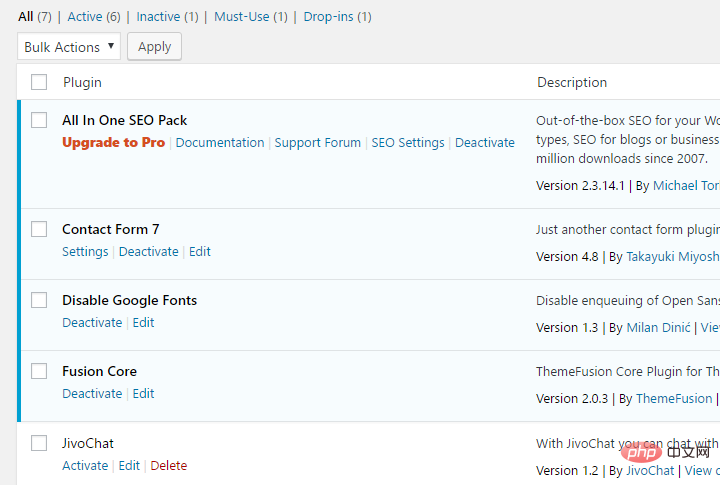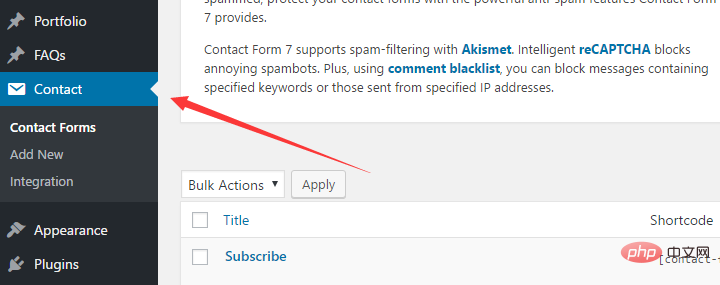How to use wordpress plug-in

Three ways to install WordPress plug-ins
First log in to your WordPress backend and find Plugins in the left menu bar (Plug-in), there are 3 options in it, as shown in the figure below, you only need to care about Installed Plugins (installed plug-in) and Add New (install new plug-in). The third Editor is the option used by programmers to adjust plug-ins. Not useful for novices.

If you are coming into contact with WordPress plug-ins for the first time, Installed Plugins will have some already installed plug-ins. Don’t make a fuss at this time. These plug-ins are hosts. bundled with the vendor, you can delete them if you don’t need them.
If you want to install a new plug-in, click Add New first. The WP plug-in will be displayed in several categories according to features, popular, recommended, and favorites. You can also enter your name in the search box in the upper right corner. Quickly find the name of the WP plug-in you want to install.
The first WordPress plug-in installation method is very simple, as shown in the picture below, just click Install Now to start the installation.

Related recommendations: "Wordpress Tutorial"
The second WordPress plug-in installation method is for the first Plug-ins from third-party platforms, such as those on themeforest.
Because these plug-ins are not classified into WP official, at this time you need to click Upload Plugin in the picture below, select the plug-in file to be uploaded from your computer, the file format is .zip, upload Just click Install after success.

The third WordPress plug-in installation method is to install through FTP. The operation method is the same as WP theme installation.
If you use the second method to install unsuccessfully, you can use this method. After the FTP upload is successful, return to the WP background, find the plug-in in Installed Plugins (installed plug-ins), and activate it Can.
Now that we have introduced the three installation methods of WordPress plug-ins, let’s briefly introduce the use of WordPress plug-ins.
How to use the WordPress plug-in
After the WordPress plug-in is installed, you can find the corresponding plug-in in Installed Plugins, as shown in the figure below, You can enable or disable plug-ins here, as well as upgrade or delete plug-ins.
If you want to delete the plug-in, click Disable first, then click Delete. If a WordPress plug-in is enabled, a blue status bar will be displayed to the left of the plug-in name. Plug-ins that are not enabled will not display this status bar.

#Once you enable a WordPress plug-in, the plug-in will be displayed in the menu bar of the WP backend, and the plug-in function settings are operated here. I take the Contact Form 7 plug-in as an example, as shown in the figure below.
I will introduce the use and settings of this plug-in in detail in future articles. If you installed and enabled the plug-in but can't find it in the left menu bar, you can go to Settings to look for it.

The above is the detailed content of How to use wordpress plug-in. For more information, please follow other related articles on the PHP Chinese website!

Hot AI Tools

Undresser.AI Undress
AI-powered app for creating realistic nude photos

AI Clothes Remover
Online AI tool for removing clothes from photos.

Undress AI Tool
Undress images for free

Clothoff.io
AI clothes remover

Video Face Swap
Swap faces in any video effortlessly with our completely free AI face swap tool!

Hot Article

Hot Tools

Notepad++7.3.1
Easy-to-use and free code editor

SublimeText3 Chinese version
Chinese version, very easy to use

Zend Studio 13.0.1
Powerful PHP integrated development environment

Dreamweaver CS6
Visual web development tools

SublimeText3 Mac version
God-level code editing software (SublimeText3)

Hot Topics
 1666
1666
 14
14
 1425
1425
 52
52
 1328
1328
 25
25
 1273
1273
 29
29
 1253
1253
 24
24
 How to adjust the wordpress article list
Apr 20, 2025 am 10:48 AM
How to adjust the wordpress article list
Apr 20, 2025 am 10:48 AM
There are four ways to adjust the WordPress article list: use theme options, use plugins (such as Post Types Order, WP Post List, Boxy Stuff), use code (add settings in the functions.php file), or modify the WordPress database directly.
 How to build a website for wordpress host
Apr 20, 2025 am 11:12 AM
How to build a website for wordpress host
Apr 20, 2025 am 11:12 AM
To build a website using WordPress hosting, you need to: select a reliable hosting provider. Buy a domain name. Set up a WordPress hosting account. Select a topic. Add pages and articles. Install the plug-in. Customize your website. Publish your website.
 How to change the head image of the wordpress theme
Apr 20, 2025 am 10:00 AM
How to change the head image of the wordpress theme
Apr 20, 2025 am 10:00 AM
A step-by-step guide to replacing a header image of WordPress: Log in to the WordPress dashboard and navigate to Appearance >Theme. Select the topic you want to edit and click Customize. Open the Theme Options panel and look for the Site Header or Header Image options. Click the Select Image button and upload a new head image. Crop the image and click Save and Crop. Click the Save and Publish button to update the changes.
 How to import the source code of wordpress
Apr 20, 2025 am 11:24 AM
How to import the source code of wordpress
Apr 20, 2025 am 11:24 AM
Importing WordPress source code requires the following steps: Create a sub-theme for theme modification. Import the source code and overwrite the files in the sub-topic. Activate the sub-theme to make it effective. Test the changes to make sure everything works.
 How to view the front-end of WordPress
Apr 20, 2025 am 10:30 AM
How to view the front-end of WordPress
Apr 20, 2025 am 10:30 AM
You can view the WordPress front-end by logging into the dashboard and switching to the View Sites tab; automate the viewing process with a headless browser; installing the WordPress plugin to preview the front-end within the dashboard; viewing the front-end via a local URL (if WordPress is set locally).
 What are the plugins for wordpress blocking ip
Apr 20, 2025 am 08:27 AM
What are the plugins for wordpress blocking ip
Apr 20, 2025 am 08:27 AM
WordPress IP blocking plugin selection is crucial. The following types can be considered: based on .htaccess: efficient, but complex operation; database operation: flexible, but low efficiency; firewall: high security performance, but complex configuration; self-written: highest control, but requires more technical level.
 How to cancel the editing date of wordpress
Apr 20, 2025 am 10:54 AM
How to cancel the editing date of wordpress
Apr 20, 2025 am 10:54 AM
WordPress editing dates can be canceled in three ways: 1. Install the Enable Post Date Disable plug-in; 2. Add code in the functions.php file; 3. Manually edit the post_modified column in the wp_posts table.
 How to register a wordpress account
Apr 20, 2025 am 11:45 AM
How to register a wordpress account
Apr 20, 2025 am 11:45 AM
To create an account on WordPress, simply visit its website, select the registration option, fill in the registration form, and verify your email address. Other ways to register include using a Google account or Apple ID. The benefits of signing up include creating a website, gaining features, joining the community, and gaining support.




